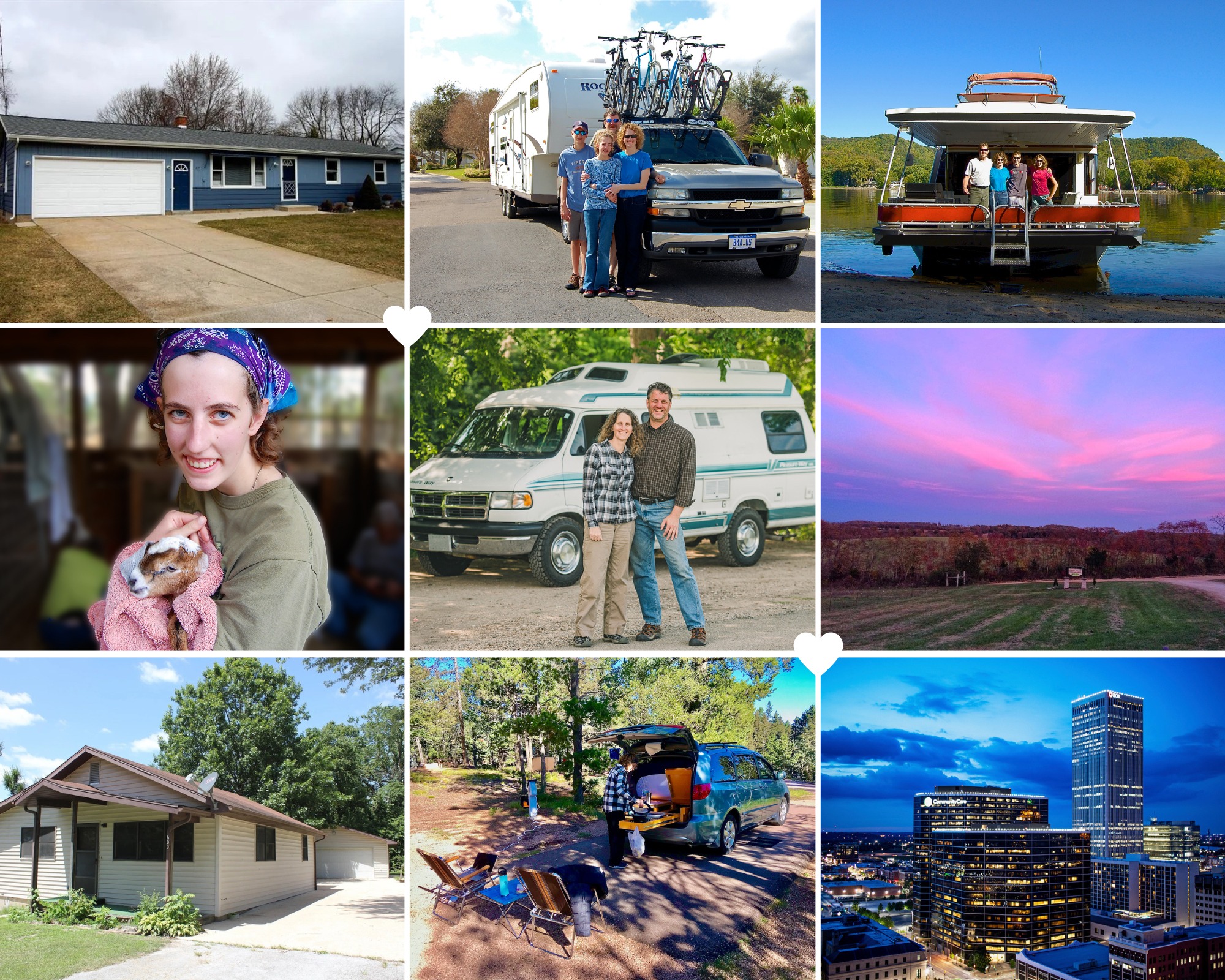
From RVing to Vanlife to Slow Travel: Comparing Digital Nomad Lifestyles
Discussions of #remotework and #digitalnomads are all the rage on LinkedIn these days.
One of my ongoing frustrations is that the conversations tend to assume a digital nomad is a single (young) person, jumping around different countries every couple of months, living out of hotels or hostels.
And that it's a recent trend, fueled by COVID.
So maybe this is one large "get off my lawn" post....
But as a remote worker of 20 years and being what I consider nomadic for over half of that, I wanted to show how remote work can power a number of different lifestyles.
And how being a digital nomad can look very different from the popular picture.
Summarizing 30 Years in 7 Paragraphs
MsBoyink and I started our family the same way we grew up - with a house in the suburbs. We chased the "standard" American Dream that media and pop culture sold us. We had the ranch house, station wagon, and dog.
Self-employment and homeschooling set us up to travel fulltime by RV with our kids.
During our eight years on the road we "tried on" additional lifestyles including a houseboat, goat farm, and dairy farm (and yes, I did write a book about it. You should totally check that out.)
Eventually, the kids aged out and MsBoyink and I downsized to #vanlife, then got off the road to live in a small, rural, Christian community. From there, we bought a small house in a town of 2800.
Now we're in an apartment in downtown Tulsa, Oklahoma experiencing big city life.
I got asked recently to compare and contrast our lifestyle experiences.
So here we go.
Suburban Life
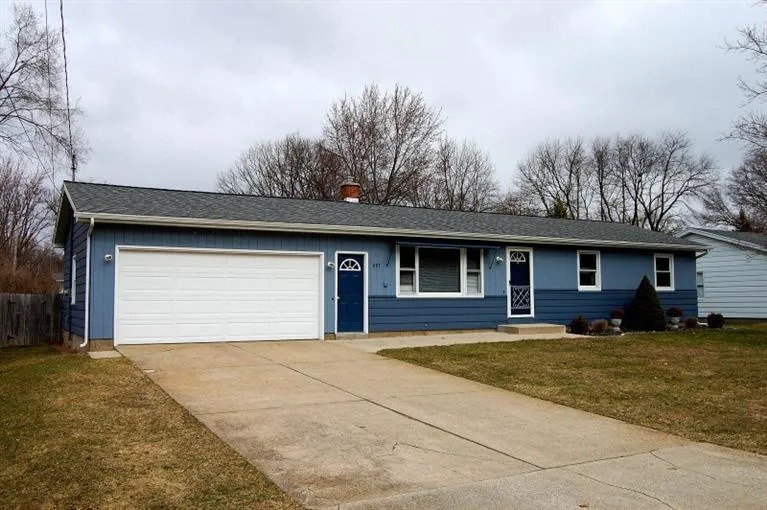
Our first home was a ~1100 square foot, three bedroom ranch in Holland, MI.
What We Liked:
- Excitement over first home purchase
- Home improvement projects
- Room for hobbies
- Being able to host family for holidays & birthdays
- Feeling like we were building a future
- Having space to homeschool the kids
- Starting a business from home and seeing my kids grow up
What We Struggled With:
- Feeling isolated
- Never meeting some of our neighbors
- Paying for big repairs (roof, furnace, etc)
- Losing equity to market downturns
- Lawn maintenance
- Lack of money or time for vacations
- Neighborhood decline
- Routine and boring days
- Lack of excitement for the future
Mainly, our suburban experience was different from every other experience on this list in one significant way: we weren't intentional about it.
We'd simply defaulted into a familiar, expected lifestyle without considering alternatives.
Feeling like our time together as a family was running short, and realizing we indeed had options, we ditched the suburbs for fulltime RVing.
Fulltime Family RVing
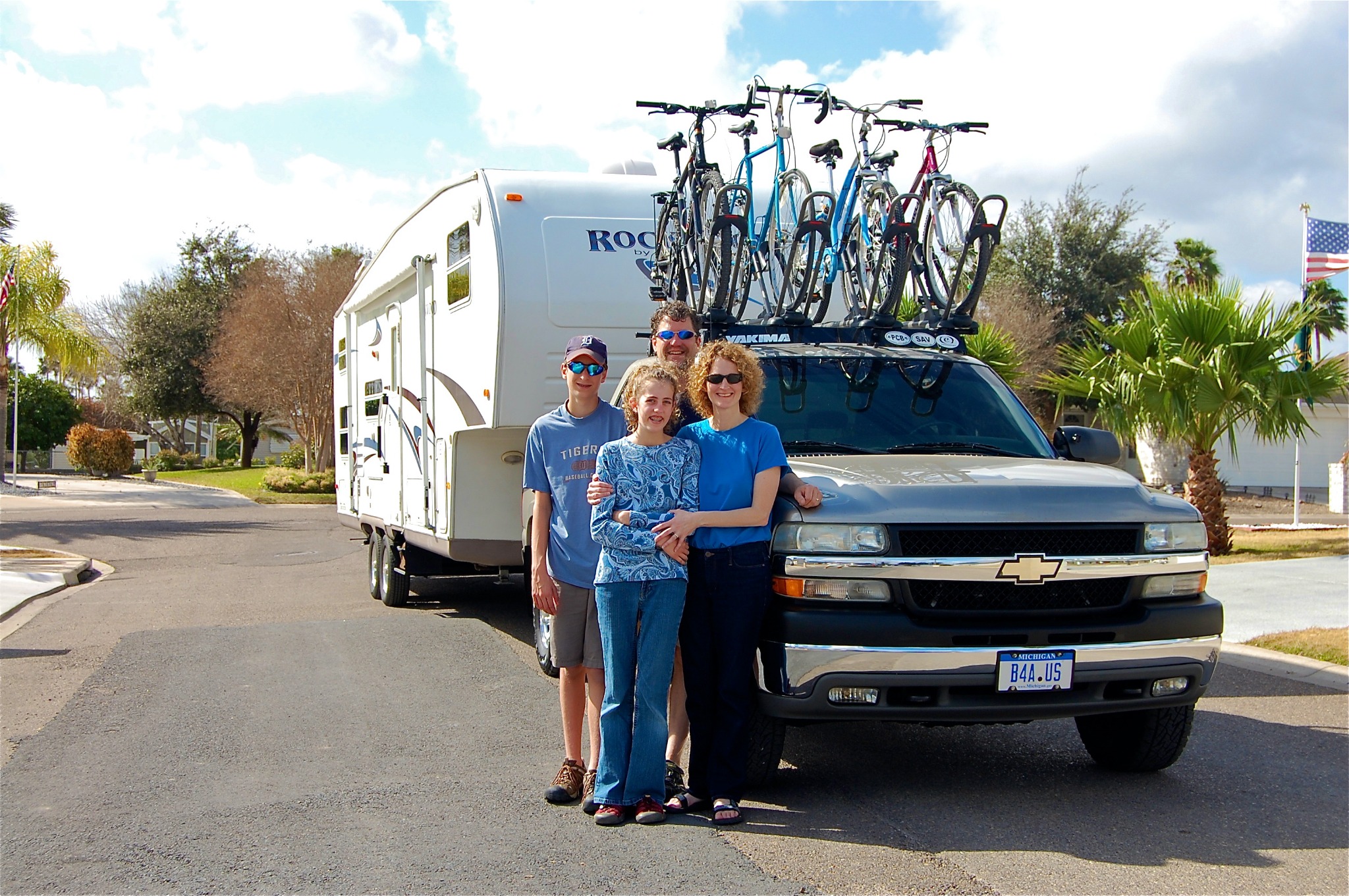
It was only supposed to be for a year. We ended up on the road for eight.
Have I mentioned I wrote a book about our years on the road? The book also has 500 photos from around the USA. A few of them are even good.
What We Liked:
- The "own our days" freedom of self-employment, homeschooling, and travel
- Getting rid of stuff/living a minimalist lifestyle
- Making lifelong friends from the community of like-minded families doing similar things
- Making memories with our kids before they aged out
- Learning history where it happened
- Seeing the incredible beauty in the United States
- Being counter-cultural, poking fun at traditions
- Being able to relate to more people because we'd been where they were from
What We Struggled With:
- Finding balance between work, school, exploration
- Recovering from changes in income sources and amounts
- Saving for retirement
- Feeling confident about homeschooling / roadschooling curriculum
- Meeting other travelers
- Breaking out of the "RV bubble" to experience non-middle-class-white culture and people
- Finding any kind of fitness routine
- Missing out on family events
- Truck/trailer repairs
Houseboat Living
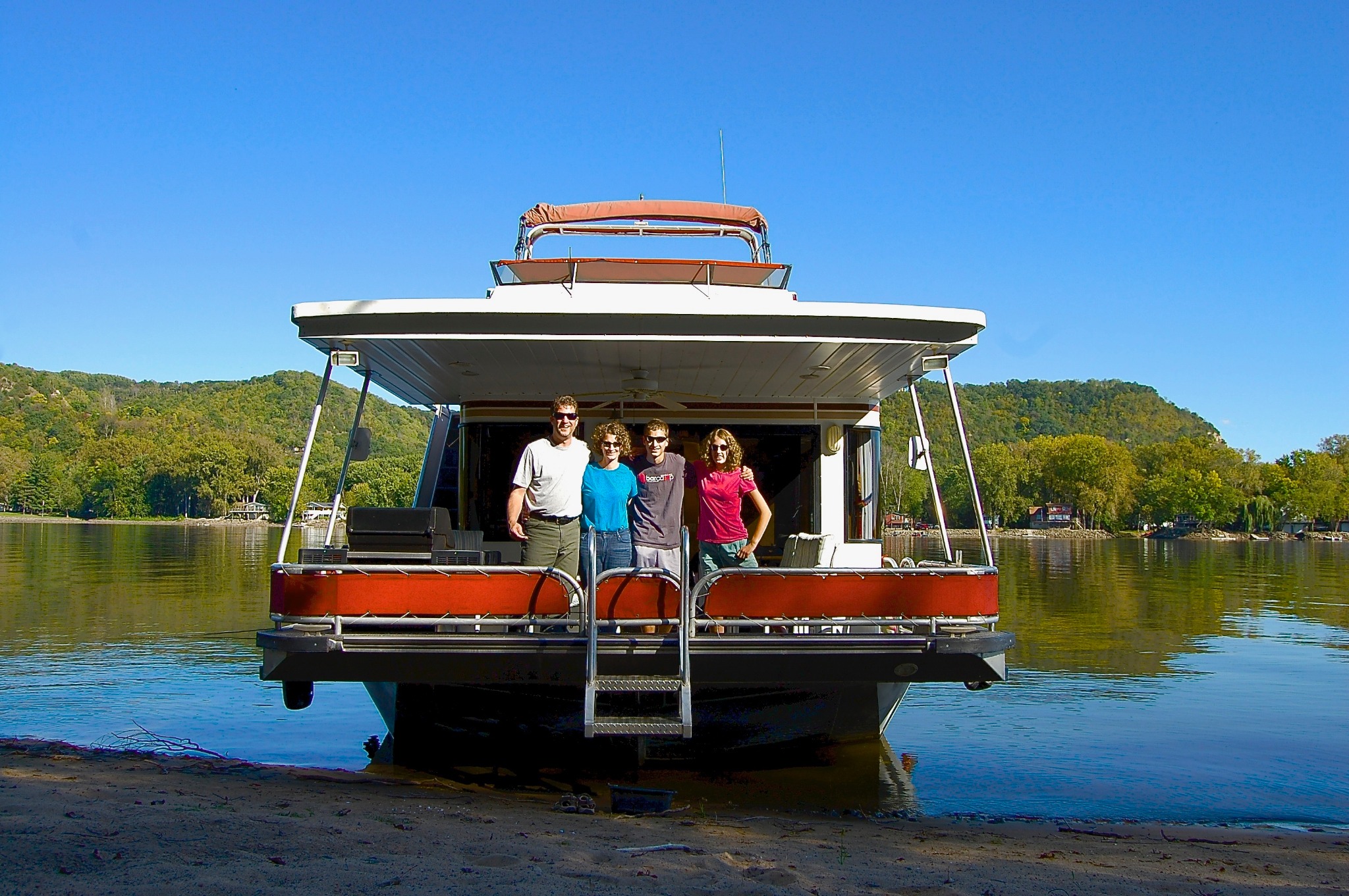
Well, OK. This was just for a week.
But at the time, I was seriously thinking about selling our truck and RV and moving the family onto a houseboat. Renting one for a week was a way to experiment with the idea before making the jump.
Or not, as it turned out.
What We Liked:
- The connection to Mark Twain, Huck Finn, and Tom Sawyer
- Meeting other people traveling the river
- Scenic river vistas
- Wildlife sightings
- Quiet overnights while beached
- Fishing off the rear deck
- The challenge of doing something new
- Encountering a classic Mississippi riverboat
What We Struggled With:
- Piloting/beaching the boat, especially on a busy river
- Getting through the locks
- Being restricted to the shipping channel while moving
- Worrying about hidden underwater wingdams
- Crazy-busy weekend river traffic
- Negotiating with other (bigger) river traffic
- Lack of easy access to shopping
- Worry about underwater damage or maintenance
- Being limited geographically
- Fuel usage with two V8 engines
A week was all it took. While it was a good experience overall, houseboat life didn't feel as free as RV life. We were happy to trade keels back for wheels.
Farm Life / Homesteading
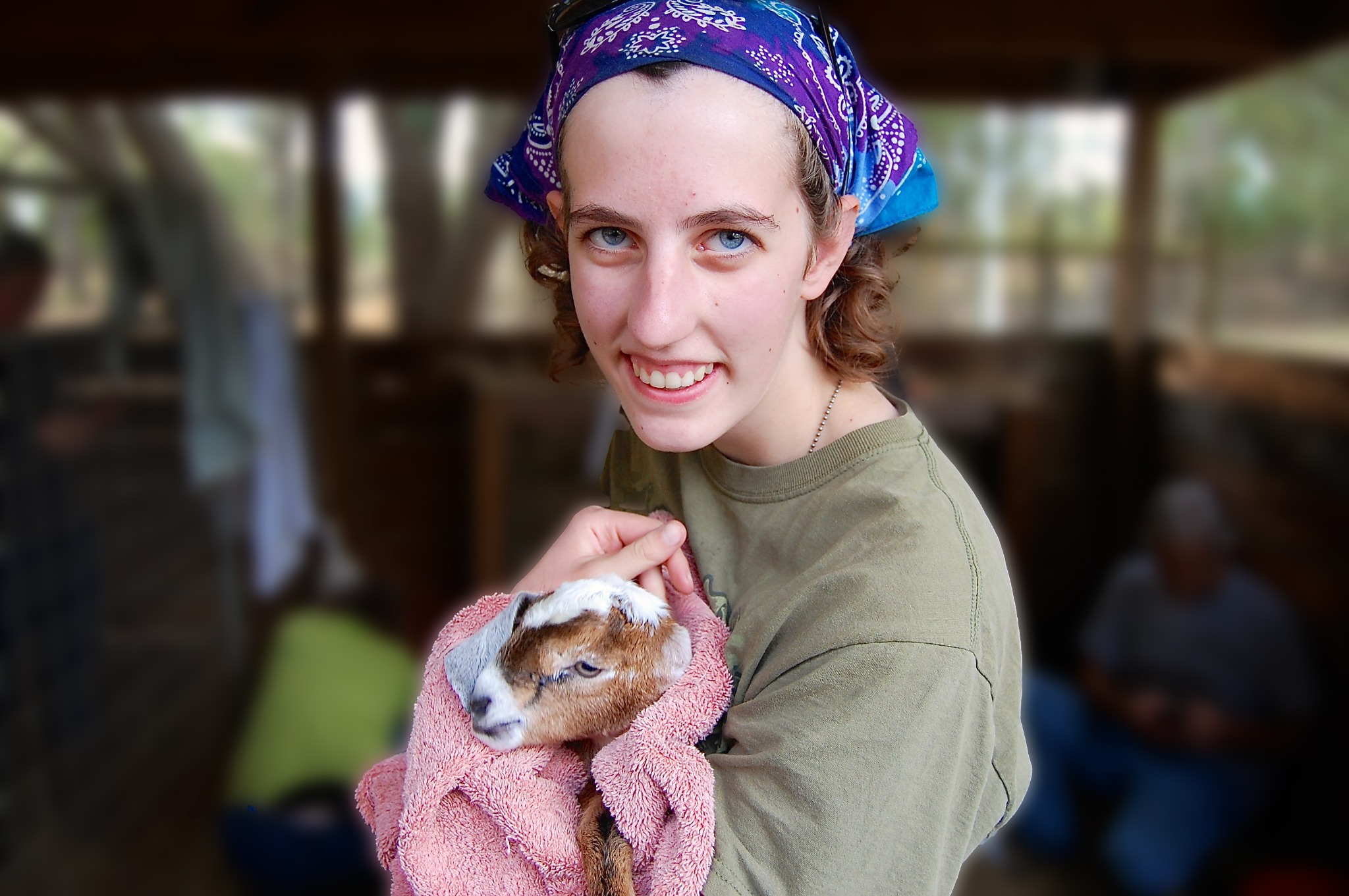
Self-sufficiency. Growing our own food. Going back to how our grandparents and great-grandparents lived.
There was a time we thought farming might be the next thing after RVing. We had RV friends that bought a chunk of rural land and raised animals and grew vegetables. It looked intriguing.
We found three farms with room for us and the RV. One was a goat farm that sold goat-based milk, soap, and cheese. Another was a dairy farm. The third was an animal rescue ranch.
What We Liked:
- Quiet rural living
- Knowing where our food came from
- Meeting "WWOOFers" working on the farms
- Seeing our kids develop independence
- Learning to raise and cook fresh food
- Learning to make cheese and soap
- Interacting with the animals
- Learning to ride horses
- Being outdoors doing physical work
- Learning to use tractors, backhoes, etc
- Baby goats!
- Baby goats!
What We Struggled With:
- Amount of equipment/land/stuff required
- Amount of labor required
- Having a very set schedule
- Lack of day to day freedom
- Constant mess of multiple unfinished projects
After several months spent on farms, we learned they don't happen quickly. It takes time to get land in shape, crops planted, infrastructure built, and harvesting processes developed.
We realized our cheap labor source (kids) would soon dry up. Even if we started homesteading immediately, MsBoyink and I would quickly be empty nesters with an unfinished nest.
We had to face the hard reality that farm life would be too much work for the two of us, especially if we had to also maintain income-generating jobs for several years before the farm was self-sufficient.
We weren't quite ready to put down roots that deep. There were still places to see.
#vanlife
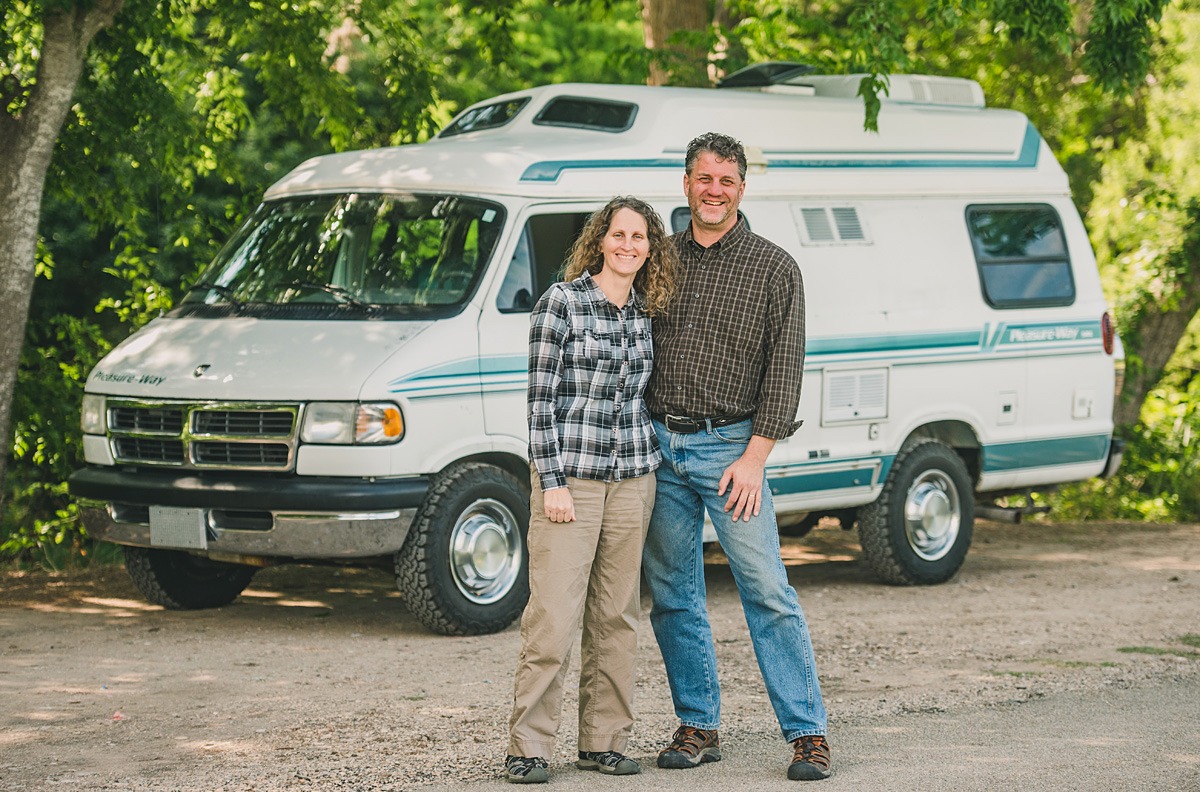
Fast-forward a few years.
Our oldest was off on his own. The youngest had a date circled on the calendar. An unexpected and expensive truck repair meant it was time for a change.
We sold the truck and 34' fifth wheel RV and bought an "almost vintage" 19' Class B/campervan.
Living in a van is mostly the same as living in an RV, sure. But the few differences are significant.
What We Liked:
- Smaller size meant we could stay in remote places we couldn't before
- Increased mobility
- Ease of parking
- Increased fuel mileage
- Ability to use drive-thrus
- Everything we had was always with us
- Ease of urban exploration
- MsBoyink could use it solo
- Simplicity (I had one key on my keyring)
- Onboard generator enabled working all day in scenic non-camping spots
- Challenge of extreme minimalism
What We Struggled With:
- I couldn't stand up inside
- The bed was a bit small
- No secondary transportation for running errands
- Constant maintenance on an older rig
- Required extreme downsizing to live in
- We couldn't shower in it
- Small tank capacities limited length of stays in rustic places
- No room for hobbies
You haven't really purged until you've purged to fit two adults into a van. It gets real.
But we did it. And after months of sorting, organizing, and reconfiguring, we just about had our campervan dialed in.
And life, as it will, changed again.
It was time to get off the road completely.
Communal Life
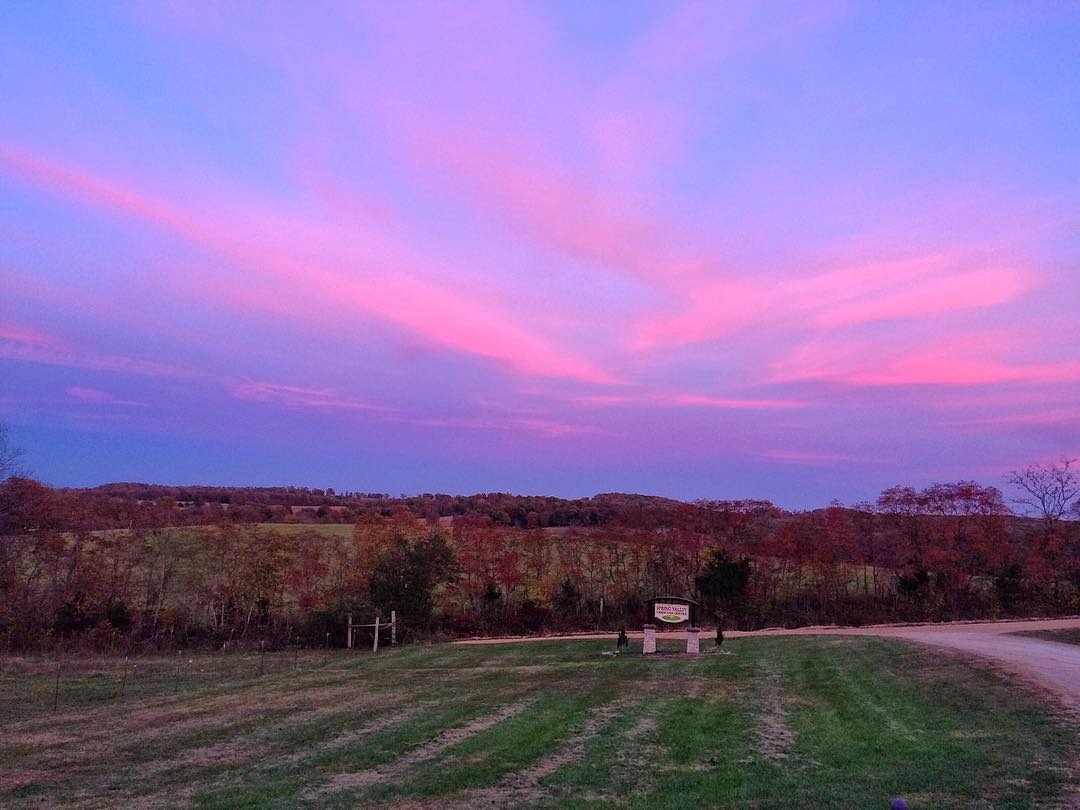
Our finances weren't great. We'd met some people on our travels who invited us to come stay with them rent-free. They were part of a Christian community on a large piece of land in rural Missouri.
There are almost as many models for communal living as there are floorplans for RVs. Some groups live in larger buildings and pool their incomes.
In this group, families manage their own finances and live in their own homes placed on communal land.
They work together to:
- Build their church and school
- Raise cattle
- Eat together three times a week
- Worship together every week
We accepted their offer and moved in with a married couple for several months. We had our own bedroom, bathroom, and living room. We shared a kitchen and often dined together. We sold the campervan and bought a cheap used car.
What We Liked:
- Seeing how the community came together to accomplish goals
- Living out our faith in a deeper way
- Building closer relationships
- Having wise mentors
- Having a financial cushion while we figured out next steps
- Seeing yet another way to live life outside the expected norms
What We Struggled With:
- The commute to town
- No one else in the community being at our stage of life
- Being new to a group who had a long history together
- Community projects coming up when we had plans
- Being stationary
The community generously offered us land to build or place a home on. We researched putting a small manufactured home on it. The lot was typical Ozark forest - wooded and sloped. Utilities were nearby but would need to be extended.
The lot was on a gravel county road three miles from pavement and 12 miles from town. The gravel road was always rough and inclement weather could turn it impassible.
Ultimately the road, the math, and the pre-COVID real estate market made the answer clear. We bought an existing house in town for less than the costs of prepping the undeveloped land.
Rural Small Town
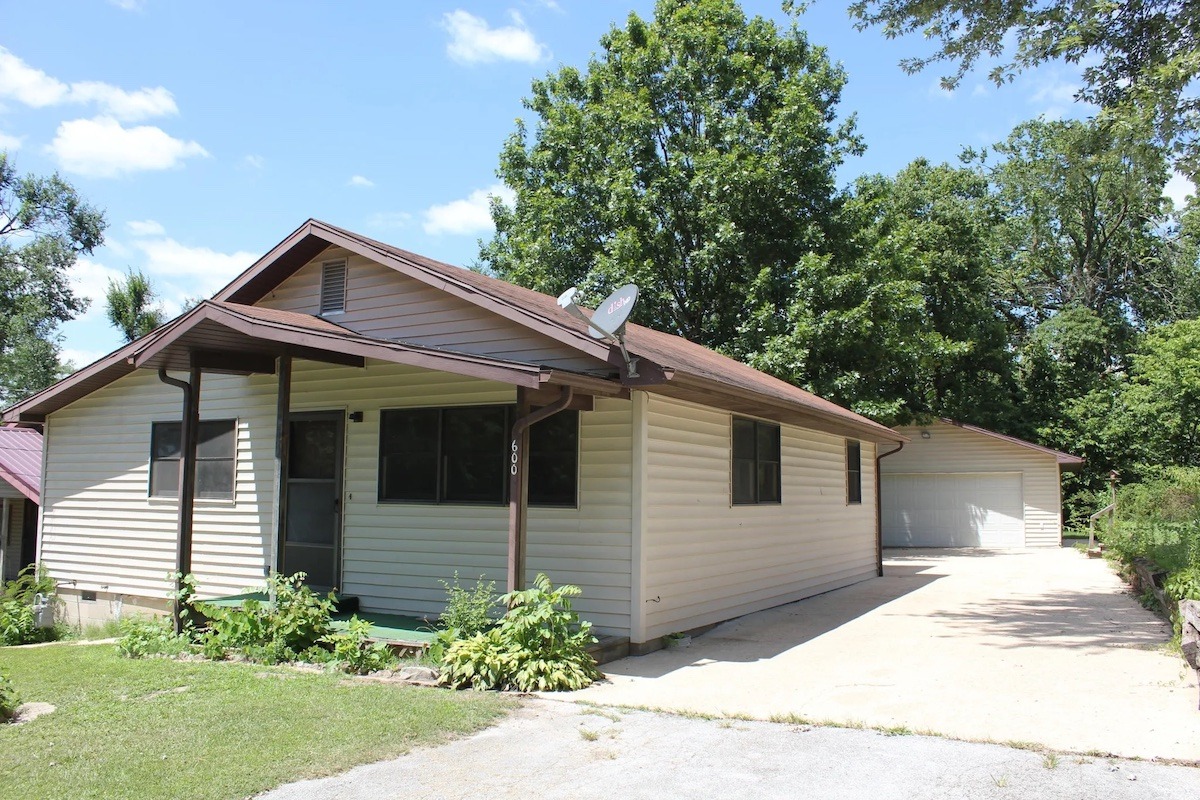
After a few months of shopping we closed on an ugly little 2BR, 1.5BA 900 sq. ft. house in the nearby town of 2200 people.
Town was just big enough for a small Walmart, a few restaurants, and two hardware stores.
It was also home to the 130 year old weekly newspaper that MsBoyink and I ran for a couple years.
Our house was three city blocks away from the newspaper. I was the Editor and MsBoyink was the Advertising Manager. Our offices were side by side. The 3rd generation owner became a dear friend.
I was also the main reporter covering city council, the school board, and writing features. I knew the mayor, aldermen, police chief, sheriff, school superintendent, prosecuting attorney, judge, and most of the downtown business owners.
What We Liked:
- Filling a need for local journalism
- Being deeply involved in a community
- Having people appreciate our work
- Working side by side as spouses
- Seeing my writing and photos in print each week
- Learning local history
- Experiencing small town America
- Outfitting the house to suit our style and hobbies
- Having a shop space again
- Getting to know our neighbors
What We Struggled With:
- Rigid weekly schedule
- Difficulty of taking vacations
- Expectations of after-hours, weekend, and holiday coverage
- Drama from people who didn't appreciate our work
- Benefits and pay were less than corporate work
- Keeping the paper staffed
- Transition to new ownership
The owner we loved working for sold the business and retired. The new owner, well. Let's just say he wasn't someone we wanted to work for (I have stories).
We stayed on for a year to maximize the odds that the paper would survive the transition, then I found a new remote job.
Part-time #vanlife
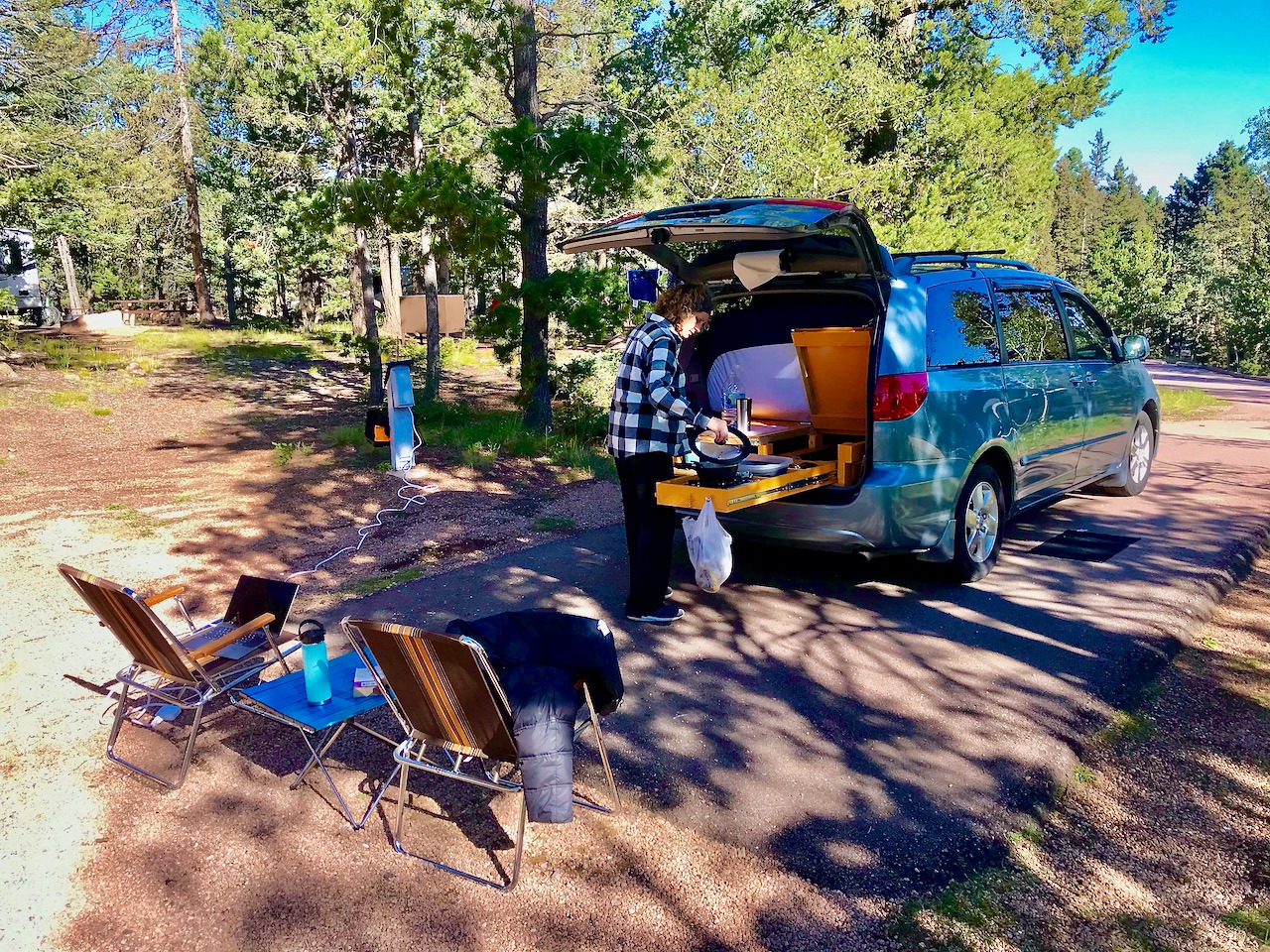
While at the newspaper, I started scheming a way to get relief from the rigid schedule, lack of vacations, and tight budget.
My thinking evolved into a home-built stealth weekender campervan. I wanted something we could park - for free - on a city street, at a Walmart, or in a hotel parking lot and not be noticed.
I figured the longest we could get away from the paper was for a long weekend of three days. The conversion from passenger van to camper van could be simple - I didn't need a full-blown RV.
I bought a used Toyota minivan and built a bed, clothes storage, and a simple kitchen with a single burner stove and a good cooler.
What We Liked:
- Easy, cheap option for getting away
- Quick setup
- Doubles as our daily driver
- Can take naps while MsBoyink drives
- Can drive 80 MPH and get 20+ MPG
- It presents as a totally normal average family minivan
- We could rustic-camp at Missouri conservation areas for free
What We Struggled With:
- I can't sleep with all the windows blocked
- No shower or bathroom
- Lack of sitting space for after dark and before bed
- Have to keep buying ice
- Loss of passenger seating when not camping
We still have the van and use it as our daily driver and for camping. It's been to 18 states. We've used it for periods up to two weeks, either overnighting in free spots or paying for campsites in county and state parks.
It works well enough, but I'm starting to scheme the next build which will have a 12v refrigerator powered by a house battery and solar panels. And all on a four wheel drive platform for more rustic camping capabilities.
Overall, part-time #vanlife with a minivan helped us stay sane while working a job that couldn't be done remotely.
Big City Apartment / Slow Travel
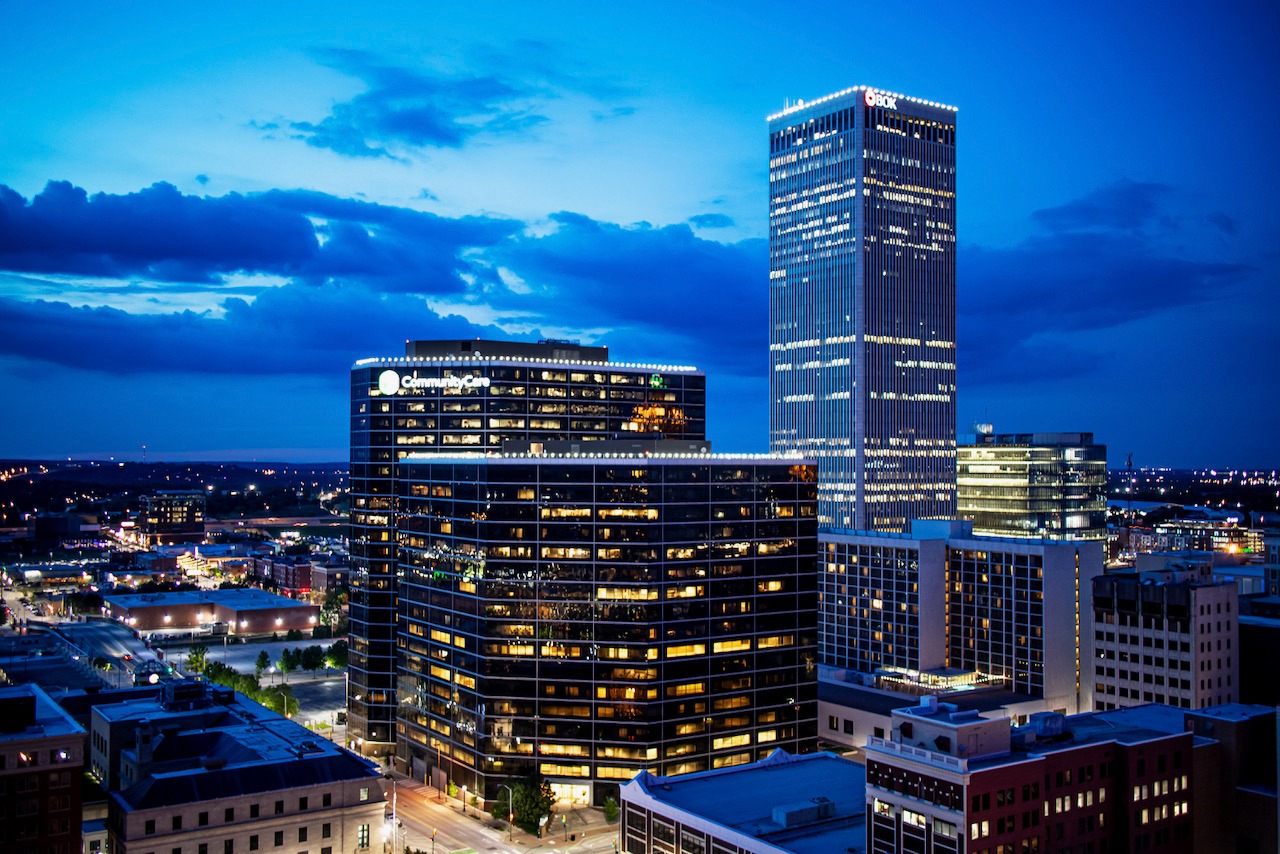
While we were in the small town and running the newspaper we were deeply integrated in the community.
After leaving the paper and working online/remote, we were almost totally disconnected from the community. We were living more "on" the town than "in" the town.
There wasn't an overabundance of things to do to begin with, then COVID sucked the remaining fun out.
Most nights we'd end up staring at screens for entertainment.
So I started looking for "the next thing."
Maybe we could be lighthouse keepers? Or European house-sitters? Or fish hatchery security staff?
I subscribed to the Caretaker Gazette and kept an eye on the listings. Many of them are full-time, live-on-site kind of jobs that don't play nicely with an existing remote job. Or they are offseason (MsBoyink wasn't big on an Alaskan winter, etc).
Then some RVing friends told us about TulsaRemote. The program pays remote workers with an existing job to move to Tulsa, OK, gives you a coworking membership, and plugs you into a busy program of coordinated events.
I researched the living costs and found downtown apartments in the $1000 - $1500 per month range. Between the moving incentive and renting our house out, we could afford to see what a more walkable, apartment-based big city life could be like. We'd daydreamed about such a life while RVing, but couldn't afford the cities we liked (hello, Austin.)
I applied, interviewed, got accepted, we found friends to rent our Missouri house, and we moved to downtown Tulsa in February of 2023.
What We Like:
- Hearing live music every week
- Having upscale theater and orchestra options
- 100+ restaurants within 1.5 miles
- Walking to a gorgeous library three blocks away
- Making connections with local organizations like RetrainTulsa, InTulsa, the Tulsa Press Club, etc.
- Meeting other TulsaRemoters
- The strong entrepreneurial economy
- Being in a more diverse community
- Coworking and other options for getting out of the apartment on workdays
- Proximity to mountains and oceans for camping trips
What We Struggle With:
- Keeping our calendar straight
- FOMO with concurrent events
- Meeting people at the same stage of life
- Hot weather
- Sound levels at many of the networking and social events
Any negatives aside, we are enjoying Tulsa. I'm working with the Press Club on what I think will be a cool event for local photographers.
MsBoyink is in the middle of a nursing refresher course through the University of Oklahoma. When she completes that she'll look for a local nursing job.
And After TulsaRemote?
We know we'll stay on past our year, but don't know for how long. We still have a house and vehicle in Missouri that we need to make decisions on. Right now it's easier to pretend they don't exist.
And what next?
Who knows.
We have never been, at any point in our lives, somewhere I thought we were going to be five years previous to that moment. Or three years even.
So I've given up trying to answer that whole "where do you want to be in X number of years?" question.
And - like Parenthood's Grandma - I prefer the rollercoaster anyway.
But, whatever it is, I'm reasonably sure remote work will enable it. And we'll consider it as just another step on a nomadic life that's always been changing speeds
6 Comments Add a Comment?
Marticia
You have and are continuing to live such a full life. I love how you “try life on”. I agree with the downtown living comments, I always had a dream of living downtown but now we can afford it and we are loving it. I have 6 year old twin boys so we will be leaving downtown for a house with a backyard but not leaving Tulsa. We plan on being here until the twins finish elementary school.
Thank you for sharing!
Michael Boyink
Thanks Marticia! We really need to meet in person at some point..;)
Heather Gebbia
Hi Mike and Crissa, I really enjoyed reading this blog post. Of course I can totally relate to the first 2: suburban dwelling and then fulltime RVing with kids. Now our kids are almost to that point of moving on so it's time to figure out what's next. I like reading about all the things you did next. Who knows what is next for us, but I'm struggling with this chapter coming to an end.
Michael Boyink
Nice to see a comment from you Heather! No doubt, kids moving on from our day to day care is a big transition. One of ours went out smoothly, the other was a bit bumpier. We'll pray for strength and wisdom as you and your boys work through that process to find the "next normal."
Norm H.
Enjoyed reading your comparisons. As someone who lived the suburban life up to retirement, and who is now about a year and a half into full-time RV life I find the "pros and cons' fascinating. Given our ages we know we'll not likely be doing this for eight years, but we will always likely enjoy exploration. Glad to see Tulsa is working out well for both of you at this time. Keep on exploring however frequently, and in whatever format, that looks like for you! Best to you both.
Michael Boyink
Thanks Norm!